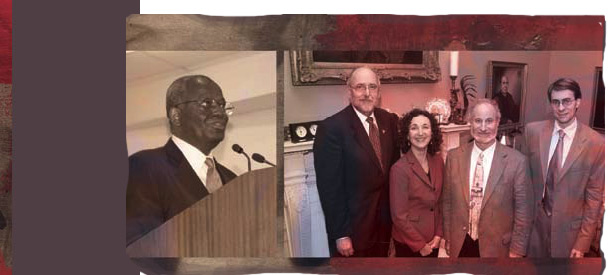| |
|
 |
|
|
OF UNIVERSAL RIGHTS AND CONFLICTS THAT THREATEN HUMANITY
continued
KEYNOTE ADDRESSES
Conference keynote addresses featured
Kenneth Roth, executive director, Human
Rights Watch, on “Is Justice Really an Obstacle
to Ending Wars and Toppling Dictators?”
and Ibrahim Agboola Gambari,
under-secretary-general for political affairs,
United Nations, on “Conflict Resolution.”
Roth has served as executive director
of Human Rights Watch since 1993,
and since that time the organization has
quadrupled in size. It now is the largest
U.S.-based human-rights organization and
is active in about 70 countries.
Roth, who noted that he was particularly
impressed by FDU’s mission of global education,
said that if you murder one person you
end up in jail, but if you murder thousands,
you have the power to arrange immunity
from justice. However, he added, with the
end of the Cold War, the establishment of
tribunals to investigate crimes against humanity
and the creation of an International
Criminal Court, progress is being made. Often,
he said, there is pressure to offer amnesty
in the hopes that it will deter perpetrators
from continuing to fight or stay in power.
“It may look enticing to give amnesty, but
justice will often create better conditions for
peace and offer a better prospect of deterring
future perpetrators,” he explained.
|
“The more we reduce
conflicts, the more we are going to increase
the observance of human rights.”
— Ibrahim Agboola Gambari
|
|
 |
| |
Left photo: Keynote speaker Ibrahim
Agboola Gambari,
under-secretary-general
for political affairs, United Nations.
Right photo: from left, President J. Michael
Adams, with conference organizers Elise
Salem and Joseph Chuman, and keynote
speaker Kenneth Roth, executive director of
Human Rights Watch.
Gambari holds the second most influential
position in the U.N. Secretariat.
Prior to that post, he was the longest serving
ambassador of Nigeria to the United
Nations, and he chaired the U.N. Special
Committee Against Apartheid. He received
an honorary doctorate from FDU at last
year’s commencement.
Gambari described the decline in conflicts
between countries and said that overall
the number of conflicts in the world is
decreasing. Most of the conflicts today, he
said, are conflicts within countries. “More
than 60 percent of the U.N. Security Council
agenda is focused on intrastate conflicts,
mostly in Africa.”
Noting that Africa is the richest continent
in terms of natural resources, but is
the poorest continent economically, Gambari
said the reason for this is the lack of
peace. He explained that this can become
a negative cycle, saying, “The lack of economic,
social and political development is
the root of conflicts.”
He said that unfortunately not enough
emphasis is given to preventing conflicts
before they arise and understanding the
issues and causes. “The more we reduce
conflicts, the more we are going to increase
the observance of human rights.”
Next …
|
 |
|
FDU Magazine Home | Table of Contents | FDU Home | Alumni Home | Comments
©Copyright 2007 Fairleigh Dickinson University. All rights reserved.
For a print copy of FDU Magazine, featuring this and other stories, contact Rebecca Maxon, editor, 201-692-7024 or maxon@fdu.edu. |


